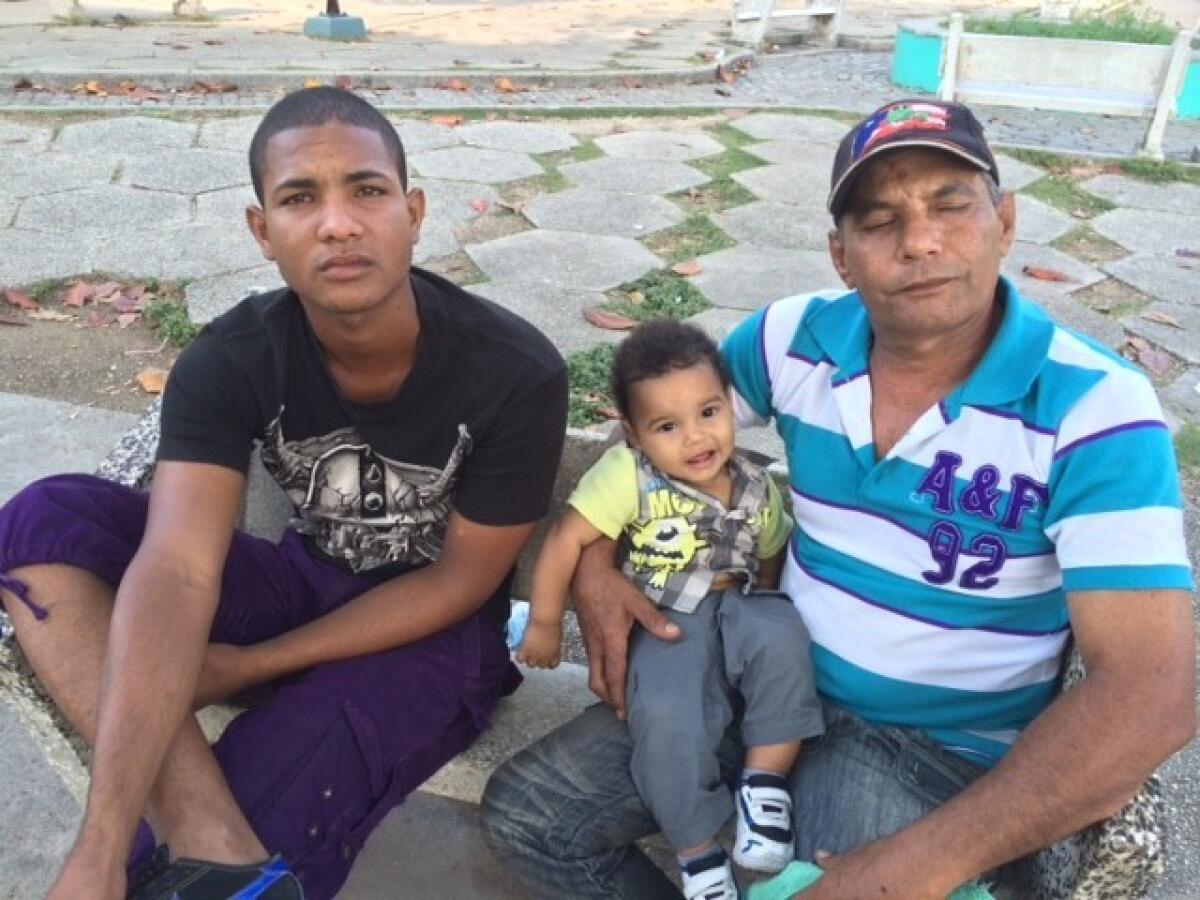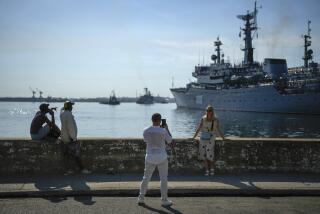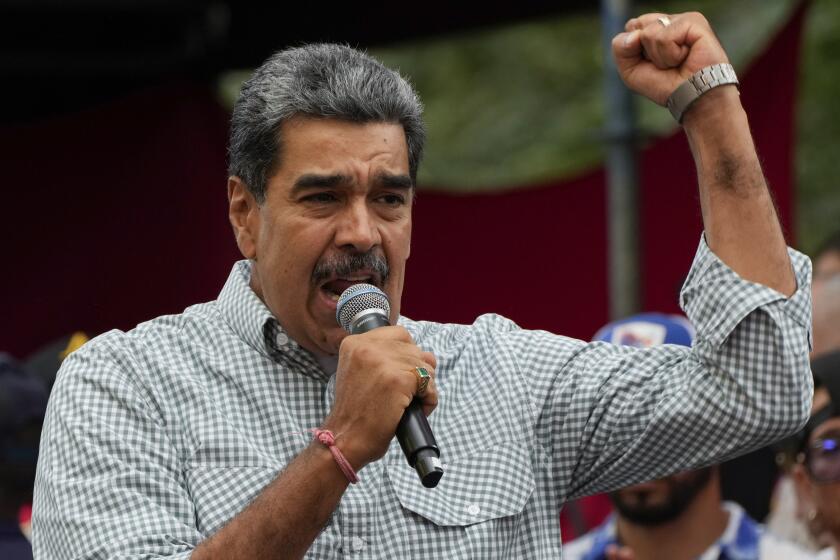U.S.-Cuba talks focus on embassies, diplomatic restrictions

Historic talks aimed at reviving diplomatic relations between Cuba and the United States, all but dead for half a century, resumed Thursday, with both sides still far apart but apparently keen to overcome fundamental differences and open embassies.
Cuba reiterated that it will not permit the normalization of relations to be a platform for demands from Washington that it change its political and economic system.
Officials also said the island nation will not be pressured to institute domestic reforms in exchange for a lifting of the U.S.-imposed trade embargo that Cuba says is to blame for the destruction of its economy.
“No one can expect that Cuba, to improve relations, renounce its principles,” Josefina Vidal, head of the Cuban delegation and director of North American affairs at the Cuban Foreign Ministry, told reporters.
Assistant Secretary of State Roberta Jacobson, leading the American delegation, said the “particular and rather peculiar” relationship that has existed between the two countries would complicate reopening embassies, a major agenda point in Thursday’s talks.
The two sides agreed, however, that international treaties will govern the establishment of embassies in Havana and Washington, possibly this year, while full normalization would require the resolving of “profound differences,” a term used by Vidal and Jacobson.
“Our efforts to normalize relations will be a continuing process that goes beyond diplomatic ties and the opening of embassies,” Jacobson said. “We have made further steps in that direction.”
The delegations representing the two nations went behind closed doors at a Havana convention center on the second day of negotiations. Jacobson is the highest ranking U.S. official to meet with the Cuban government in Havana in more than three decades.
Diplomatic ties between the countries were broken in 1961, shortly after Fidel Castro led a revolution that toppled the pro-U.S. dictatorship ruling the island. Castro’s move toward Marxism, his government’s confiscation of private property and other policies swiftly alienated U.S. leaders and led to a protracted era of hostility.
President Obama and Raul Castro, who succeeded his brother as president, last month announced an end to that era, with Obama saying the half-century-old policy of distancing had not worked in bringing about democratic change on the island.
In addition to discussing the opening of embassies in Washington and Havana, the U.S. delegation asked for a lifting of restrictions on diplomatic personnel in Cuba, who currently can’t travel beyond Havana, and a higher cap on the number of people Washington can post in the Cuban capital.
The Cubans have even loftier goals, including an end to the embargo that Washington imposed on the country when diplomatic ties were ended. However, the embargo can be lifted only by an act of the U.S. Congress, which does not seem likely at this time.
Cuba also wants to be removed from Washington’s list of state sponsors of terrorism, a more likely possibility because recent State Department reviews of the matter seem to suggest Cuba is not undermining other governments.
Vidal said both matters must be resolved before there can be a full normalization of diplomatic relations.
Jacobson said she raised the issue of human rights in a country that often jails those who criticize the government. Curiously, Vidal, speaking a few minutes later, said the issue had not come up.
“Certainly that issue [human rights] remains central to our conversation,” Jacobson said in response to a reporter’s question. “We will continue to raise that issue and did today. We do have differences, profound differences, with the Cuban government. Their response was they have differences with us on that subject.”
Unknown in this dance of detente is how far President Castro will go in accepting change. He officially took over in 2008, two years after Fidel Castro fell seriously ill.
He has said that he does not consider this new era an opening for significantly altering Cuba’s communist system, one-party rule or largely state-controlled economy. At the same time, he faces a dire economic panorama in a country that imports most of its food and where the largesse of Venezuelan oil may be ending.
“Raul Castro will try to gain the most while giving up the least,” Jose Daniel Ferrer, a leading dissident who opposes the Castro government but welcomes rapprochement, said in an interview. He insisted that pleas for better human rights conditions be part of the negotiations and of continued U.S. policy toward Cuba.
“If this is all about [U.S. firms] doing business in Cuba, and the Obama administration says, ‘We don’t care how you run things inside your country,’ then Raul and the generals will be very happy,” Ferrer said.
Obama has said the U.S. will continue to emphasize the importance of human rights and freedom of expression, as Jacobson said she did Thursday, while also keeping up what he describes as the promotion of democracy on the island, a point of frequent contention because Havana has regarded such actions as plots to destabilize the Castro governments.
Still, the air of expectation among many Cubans and Cuban exiles is unmistakable.
“Suddenly, the world that we knew has disappeared,” Carlos Saladrigas, a Cuban American businessman who lives in the U.S. and heads the Cuban Study Group, wrote in El Nuevo Herald newspaper. “The stagnation of both sides has given way to the forces of change. What will we do with all of this?”
Seated in a park in Havana’s Vedado neighborhood, the sea on the horizon, Mario Sergio Atiaga and his father-in-law, Juan Gonzalez, contemplated what better dealings between Cuba and the U.S. might mean for them.
“Prosperity, prosperity, prosperity,” said Atiaga, 19 and in military service. He and his family live in the provinces and were in Havana to see off a 12-year-old cousin traveling legally to the U.S. to reunite with her father.
“I’d like to travel and work for a little money,” Atiaga said.
Alberto Estevez, 50, was piecing together an axle for his ivory-white 1957 Opel. “We are so close,” he said, referring to the mere 90 miles that separate Cuba and the United States. “You have to think it will be better.”
Like many Cubans, Gladys Gonzalez, 73, had a list of what could improve if the U.S. and Cuba were officially friends again, from the economy to travel.
“We are already seeing more open trade and this could make everything more stable,” said Gonzalez, whose two sons are doctors.
In the first round of talks Wednesday, Cuba and the United States disagreed sharply on U.S. policies that allow Cubans to stay in the U.S. legally even when they have entered illegally. The so-called dry-foot, wet-foot rules constitute the “principal incentive and stimulus” for the flight of Cubans from the island, Vidal said.
Vidal and Jacobson dined together Wednesday night, a State Department official said. On Friday, Jacobson will meet with dissidents, something that always rankles the Cuban government.
Follow @TracyKWilkinson on Twitter for the latest news out of Cuba
More to Read
Sign up for Essential California
The most important California stories and recommendations in your inbox every morning.
You may occasionally receive promotional content from the Los Angeles Times.











